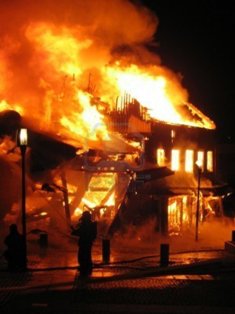 When fire or smoke unexpectedly damages your home, the first steps you take could mean the difference between a small cleanup and a more costly and time consuming restoration. Knowing when to call in a professional can save you time in getting your life back to normal and money by preventing further damage.
When fire or smoke unexpectedly damages your home, the first steps you take could mean the difference between a small cleanup and a more costly and time consuming restoration. Knowing when to call in a professional can save you time in getting your life back to normal and money by preventing further damage.
What to do BEFORE disaster strikes:
- Read your homeowner’s policy and review it annually to be sure you are adequately covered.
- Keep important documents, policies and documentation (pictures or videos) of the contents of your home, outside your home in a safety deposit box. Keep a second key with a friend or neighbor in the event your key is destroyed.
- Keep copies of the contents of your wallets in your lock box.
- Keep a spare or duplicate credit card in your lockbox.
What NOT to do if you have had fire damage:
- Do not touch anything with your bare hands. Oil from your hands can permeate upholstery, walls and woodwork, causing additional damage.
- Do not wash walls. Incorrect cleaning could compound the soot residue.
- Do not attempt to clean carpets or upholstered furniture.
- Do not use electrical appliances until having them checked.
- Do not use ceiling fixtures if the ceiling is wet.
What TO DO if you have had a fire:
- Corrosive byproducts can cause irreversible etching in as few as 72 hours. Call for professional help.
- If the temperature is above 60 degrees, air out the house to reduce odor.
- Clean Formica, chrome, porcelain and aluminum fixtures to prevent permanent tarnishing or etching.
- Change the air filter on your furnace if it uses forced hot air.
- Tape damp cheesecloth over returns and supply registers to capture loose soot in the air.
- Discard any open food packages.
- If the power is off, clean out the refrigerator and leave doors propped open.
- Send clothing with heavy smoke damage to a qualified restoration dry cleaner.
Fire Prevention Tips
- Stay in the kitchen when using the range. When cooking with oil keep a lid or flat cookie sheet close to diffuse flames if they should develop.
- Don’t cook when tired, drinking or using drugs that may cause drowsiness.
- Don’t lie down and smoke.
- Check attic and crawl spaces for wiring damaged by rodents or insects.
- Notice flickering lights or intermittent power surges. These can be caused by outside influences but often occur to indicate a bad connection or short in the circuit.
- Note breakers that trip or fuses the blow frequently. Almost always a sign of overload or other wiring issues, usually of a more serious nature.
- Check the natural gas/LP gas system look for loose fittings, faulty pilot lights, debris or improperly stored flammable materials near gas appliances.
- Check A/C and heating units, do periodic maintenance.
- Keep appliances clean, especially watch for grease accumulation.
- Keep lint traps and outside vent clean in your clothes dryer.
- Space heaters should be placed in non-traffic areas at least 3 feet from any flammable material. Do not use extension cords.
- Maintain your fireplace, use glass doors or wire mesh spark screen to prevent embers from popping out. Inspect and clean annually.
- Candles and oil lamps should never be left unattended, always extinguish when leaving the room.
- Christmas trees are highly flammable. They become highly combustible when they become dry. View this 2 minute video: http://youtu.be/dxaUj_rfkN4
- Keep matches and lighters locked up away from children.
- Keep a fire extinguisher near your grill. Decks are highly flammable.
24 Hour Flood, Fire and Mold Damage Specialists, ServiceMaster Coastal Disaster Services.
Tammy Hawkins
Marketing Administrator
www.servicemastercds.com
904-388-1100







